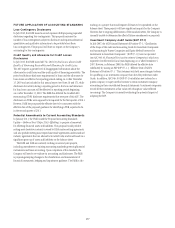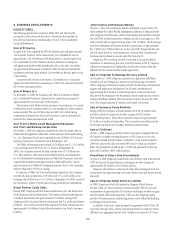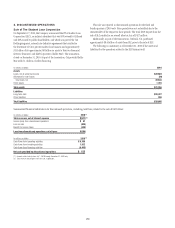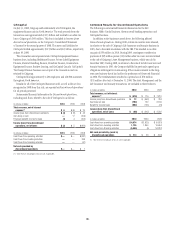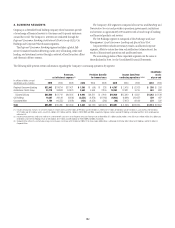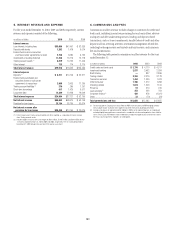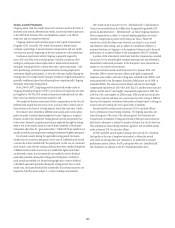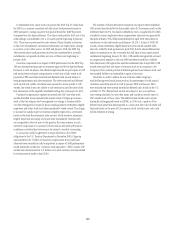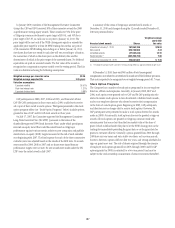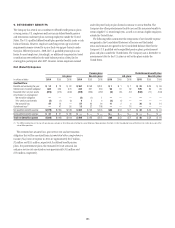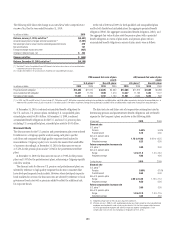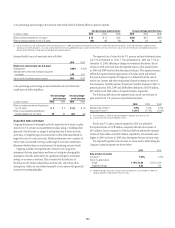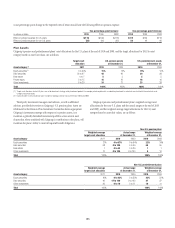Citibank 2010 Annual Report Download - page 187
Download and view the complete annual report
Please find page 187 of the 2010 Citibank annual report below. You can navigate through the pages in the report by either clicking on the pages listed below, or by using the keyword search tool below to find specific information within the annual report.185
Stock Award Programs
Citigroup issues (and has issued) shares of its common stock in the form of
restricted stock awards, deferred stock awards, and stock payments pursuant
to the 2009 Stock Incentive Plan (and predecessor plans) to its officers,
employees and non-employee directors.
Citigroup’s primary stock award program is the Capital Accumulation
Program (CAP). Generally, CAP awards of restricted or deferred stock
constitute a percentage of annual incentive compensation and vest ratably
over four-year periods, beginning on the first anniversary of the award date.
Continuous employment within Citigroup is generally required to
vest in CAP and other stock award programs. Typically, exceptions allow
vesting for participants whose employment is terminated involuntarily
during the vesting period for a reason other than “gross misconduct,” who
meet specified age and service requirements before leaving employment
(retirement-eligible participants), or who die or become disabled during the
vesting period. Post-employment vesting by retirement-eligible participants is
generally conditioned upon their refraining from competing with Citigroup
during the remaining vesting period.
From 2003 to 2007, Citigroup granted annual stock awards under its
Citigroup Ownership Program (COP) to a broad base of employees who were
not eligible for CAP. The COP awards of restricted or deferred stock vest after
three years, but otherwise have terms similar to CAP.
Non-employee directors receive part of their compensation in the form of
deferred stock awards that vest in two years, and may elect to receive part of
their retainer in the form of a stock payment, which they may elect to defer.
From time to time, restricted or deferred stock awards and/or stock option
grants are made to induce talented employees to join Citigroup or as special
retention awards to key employees. Vesting periods vary, but are generally two
to four years. Generally, recipients must remain employed through the vesting
dates to vest in the awards, except in cases of death, disability, or involuntary
termination other than for “gross misconduct.” Unlike CAP, these awards do not
usually provide for post-employment vesting by retirement-eligible participants.
For all stock awards, during the applicable vesting period, the shares
awarded are not issued to participants (in the case of a deferred stock award)
or cannot be sold or transferred by the participants (in the case of a restricted
stock award), until after the vesting conditions have been satisfied. Recipients
of deferred stock awards do not have any stockholder rights until shares
are delivered to them, but they generally are entitled to receive dividend-
equivalent payments during the vesting period. Recipients of restricted
stock awards are entitled to a limited voting right and to receive dividend
or dividend-equivalent payments during the vesting period. Once a stock
award vests, the shares become freely transferable (but certain executives are
required to hold the shares subject to a stock ownership commitment).
CAP awards made in January 2011 to “identified staff” in the European
Union have several features that differ from the generally applicable CAP
provisions described above. “Identified staff” are those Citigroup employees
whose compensation is subject to various banking regulations on sound
incentive compensation policies in the European Union. These CAP
awards vest in full after three years of service, are subject to a six-month
sale restriction after vesting, and are subject to cancellation if there is a
material downturn in Citigroup’s or the employee’s business unit’s financial
performance or a material failure of risk management (the EU clawback).
A portion of the immediately vested cash incentive compensation awarded
in January 2011 to selected highly compensated employees was delivered in
immediately-vested stock payments. In the European Union, this stock was
subject to a six-month sale restriction.
Annual incentive awards made in January 2011, January 2010, and
December 2009 to certain executive officers and highly compensated
employees were made in the form of long-term restricted stock (LTRS), with
terms prescribed by the Emergency Economic Stabilization Act of 2008, as
amended (EESA). The senior executive officers and next 20 most highly
compensated employees for 2010 (the 2010 Top 25), and the senior executive
officers and the next 95 most highly compensated employees for 2009 (the
2009 Top 100), were eligible for LTRS awards. LTRS awards vest in full after
three years of service and there are no provisions for early vesting of LTRS in
the event of retirement, involuntary termination of employment or change in
control, but early vesting will occur upon death or disability.
Annual incentive awards made in January 2011 to executive officers
have a performance-based vesting condition. If Citigroup has pretax net
losses during any of the years of the deferral period, the Personnel and
Compensation Committee of Citigroup’s Board of Directors may exercise its
discretion to eliminate or reduce the number of shares that vest for that year.
This performance-based vesting condition applies to CAP and LTRS awards
made in January 2011 to executive officers.
All CAP and LTRS awards made in January 2011 provide for a clawback
that applies in the case of employee misconduct or where the awards
were based on earnings that were misstated or on materially inaccurate
performance metric criteria. For EU participants who are “identified staff,”
this clawback is in addition to the EU clawback described above.




